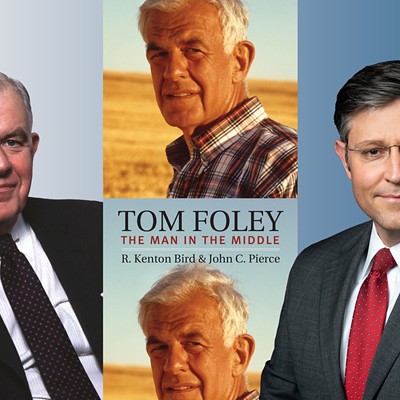The 1952 campaign can’t be understood apart from the conspiracy-mongering of the right — the sotermed “K1C2” charges of “Korea, Communism and Corruption.” While Eisenhower spouted his party’s line during the campaign, once elected it became clear (to the dismay of the Republican right wing) that he would not abandon the Truman strategy. The Republican right wanted the General MacArthur strategy of “no substitute for victory,” which translated into unification (of Korea) and liberation (of China). Ike’s three days in Korea had convinced him: Draw the line on the 38th parallel and call it good.
His incoming Secretary of State, John Foster Dulles, had by then lined up with the unifiers and liberators and argued the case; but Eisenhower wasn’t buying it. “If Mr. Dulles and all his sophisticated advisers really mean that they cannot talk peace seriously, then I’m in the wrong pew,” he told an aide afterward. “Now either we cut out all this fooling around and make a serious bid for peace — or we forget the whole thing.”
Ike had no intention of seeking the victory to unite Korea. And liberating China was out of the question.
A recent New York Times column about the way Eisenhower ended the Korean War noted that he “blew the whistle on those who sought to win the Cold War militarily, [saying] ‘Every gun that is fired, every warship launched, every rocket fired signifies a theft from those who hunger and are not fed, those who are cold and are not clothed.’” In the end, it became a question of financial priorities.
He also made it clear to South Korean President Sigmund Rhee, who wanted unification, that if South Korea didn’t take the deal, the U.S. was out of there — troops, money, everything.
The armistice was signed in July of 1953. Eisenhower had accepted pretty much the same deal that the Truman Administration had on the table at the time he took office.
Ike succeeded, even though all his campaign rhetoric had been anything but conciliatory. He played the dutiful Truman-basher. Yet when Eisenhower dismissed them all — Republican regulars and even his own cabinet — and went his own way in Korea, they held their tongues. Democrats generally applauded the general’s success.
Fast forward to 1972. Richard Nixon is in office, Mr. Communist-Hunter himself — the guy who nailed Alger Hiss. The hero to the radical McCarthy wing of the GOP. McCarthy by that time was long dead, but his followers were still representative of the far right and ever so grateful to finally have Nixon in the White House.
But what does Nixon do? He visits China.
Meets with the arch-enemy Mao. He puts China and the United States on the road to restoring their relations. At one point in his discussion with Chou En-Lai, Nixon observes that a rightist can sometimes do things a leftist can only talk about.
How true.
Eisenhower had avoided a conflict with China.
Now Nixon was actually courting them. Unbelievable! Once again, the Republican Party’s right wing fumes — again in silence. The country and, for the most part, Democrats praise him for his far-sightedness.
Now in between these two events — the end of the Korean War without victory, and the opening of China — came the Vietnam War. A tragedy of monumental proportions. And which party launched America into its worst military disaster in history? Not the Republican Party, not those professional anti-communists, but a New Deal Democrat who would just as soon have cut a deal with Ho Chi Minh and said so several times.
Yes, Eisenhower set the stage for America’s involvement when he aided and abetted the abortive restoration of the French colony. And the argument over what Kennedy, who really did keep us out of a nuclear war in those 13 days in October 1962, would have done had he lived goes on half a century later. The late Ted Sorenson, who knew Kennedy best, says that there’s no way he would have escalated that war. Regardless, by 1965, Vietnam was Lyndon’s war, and there can be no doubt that this war was the very last thing he wanted. So why did LBJ go against all his instincts? Yes, he had bought into the soon-to-be-discredited “domino theory,” but mostly he feared being branded by the radical right as “soft on communism.”
The New York Times suggests that Obama take a page out of Eisenhower’s Korean War playbook to get us out of Afghanistan. And now, after 10 years and Osama bin Laden finally killed, an orderly exit seems to be where it is heading.
That sounds good, but play the clock back and ask yourself the question: If Eisenhower and Nixon had been Democrats, what then? And if Obama up and leaves today, bin Laden’s death notwithstanding, what will the right-wingers do?
If past is prologue, if Obama makes plans to leave Afghanistan, they will accuse him of being “soft on terrorism.” After all, he is a Democrat.























